Sterling Starways: Silver Surfer #1 Review
Despite some occasionally messy metaphors, the Silver Surfer's first issue strikes at the heart of a tragic hero
—by Nathan on May 16, 2024—
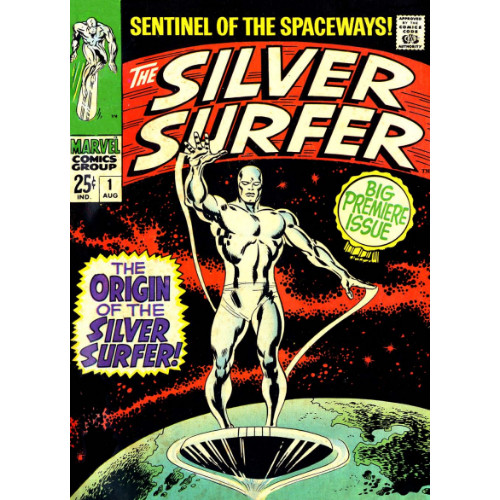
As noted in a few previous posts, I've decided to explore, among other distant spheres of the comic book industry, early Marvel narratives without "Spider-Man" in the title. I've recently examined the inaugural issues of Fantastic Four and the Incredible Hulk, two of Stan Lee and Jack Kirby's earliest creations. Today, I dive into the mind of another Lee/Kirby character, an adversary turned ally to the Fantastic Four: the Silver Surfer.
I debated whether I wished to chronicle the Surfer's debut issue at this moment because, unlike the FF or the Hulk, the chrome-colored wanderer originally appeared in a title not his own, starring in the famous "Galactus Trilogy" found in FF #47-50. Should I wait, I wondered, until I cover the first narrative featuring the godlike devourer of planets? I decided not to, as I was uncertain as to when I would reach those issues in my reading. The demands of time outweighed the demands of thematic tethering. So here we are.
This feels like a somewhat different review than those first FF and Hulk issues, or even the first Amazing Spider-Man issue. We are six years into Marvel's Silver Age of superheroes, and though the Surfer is a Lee/Kirby construct, Lee partners with a different co-conspirator for this issue: John Buscema, brother of Sal Buscema, and no stranger to cosmic epics himself. So let's soar with the Surfer as he and his soliloquies speed across a globe so unlike his beloved home.
"The Origin of the Silver Surfer"/"The Wonder of the Watcher"
Writer: Stan Lee
Pencilers: John Buscema, Gene Colan
Inkers: Joe Sinnot, Syd Shores
Colorist: Bill Everett
Letterers: Sam Rosen, Artie Simek
Issue: Silver Surfer #1
Issue Publication Date: August 1968
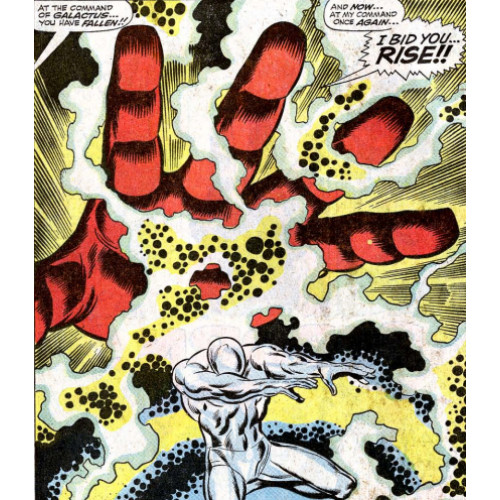
A short while back, a popular internet trend saw women approach their husbands, boyfriends, dads, brothers, etc. and ask how often they thought of the Roman Empire. Surprisingly often, some videos indicate. Perhaps it was reveling in the grandeur of an age long gone, where strength and intelligence were epitomized in pursuit of antiquated nationalistic fervor, where war was as noble as political pursuits, where peace and art reached a zenith. There's a fondness for the past, especially in light of the present age. And it's not that men consider only the Roman Empire, it's nostalgia for better days in general…with the Roman Empire angle feeling especially perplexing because we must answer the question: how can you feel nostalgic for a time you never knew? How can we know whether days of old–especially those so many centuries removed from our own–were superior to the days of now once we remove our idealization lenses?
Norrin Radd, before he was dipped in atomic number 47, is presented by Lee as a man obsessed with the "then." He wanders his planet, Zenn-La, simultaneously in love with his home and frighteningly discontented. He dreams of ages gone by, where warriors, astronauts, and explorers were heroes, the pinnacle of Zenn-Lavian humanity. He yearns to escape the ground, journey into the stars. Norrin Radd is not a slave, forced to live in drudgery. In fact, life is paradisaical on Zenn-La, every desire fulfilled, every need met. Items are manufactured instantaneously. People don't need to walk if they don't want to, transported along on moving conveyors. Norrin Radd has found love in Shalla-Bal, who worries over his own worrying. Life, to Norrin, is not enough. It should be, all the signs point to fulfillment...but it isn't. Not for Norrin.
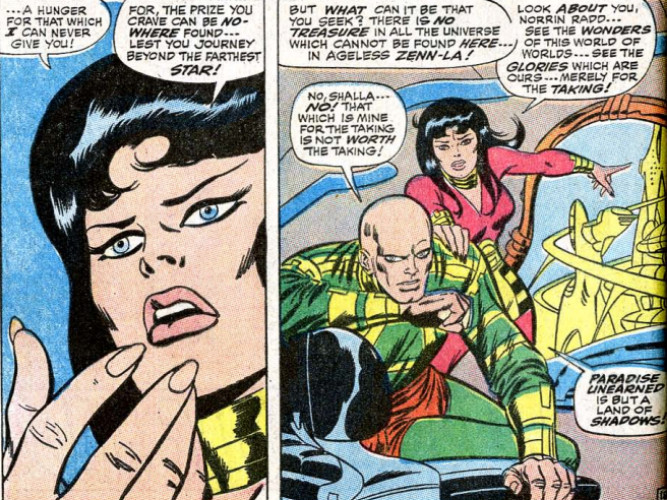
Lee is famous for creating heroes who are not whole until they embrace the situations which mold them into costumed adventurers. It's the first Iron Man armor which saves Tony Stark's life, magic which heals Stephen Strange's hands, a spider-bite which pushes Peter Parker out of his adolescent awkwardness. The prescription is not perfect, as the graveyards of dead parents, love interests, friends, and the occasional uncle can suggest, but Lee allows his heroes the opportunity to become more than they are. And so it is with Norrin. When the planet-devouring Galactus comes knocking on Zenn-La's front door, Norrin offers himself up as the giant's herald in exchange for Zenn-La's (and Shalla-Bal's) safety. He can never be with his love or return to his planet…he will leave his world and explore the stars, as he wanted, but the Silver Surfer must do so to quell the hunger of his mammoth master. By embracing who he imagined himself becoming, the Surfer pays a price.
Lee creates an interesting dichotomy within the narrative, splitting the past and the present. It's the Norrin Radd of the past who dreams of adventures and fulfills his desires in the most unexpected way, forced to wander at Galactus' whims. And it's the Norrin Radd of the present who, after betraying Galactus to save another planet, finds himself imprisoned on Earth, his space-faring abilities removed by his enormous employer. We empathize with pre-silver Norrin Radd, knowing his ultimate fate and the twist by which his wish will be granted. And we likewise empathize with his present self, harassed by a suspicious populace even while he recounts betrayal at the hands of individuals such as Doctor Doom. Nothing like good old public hatred to make you feel sorry for a Stan Lee superhero.
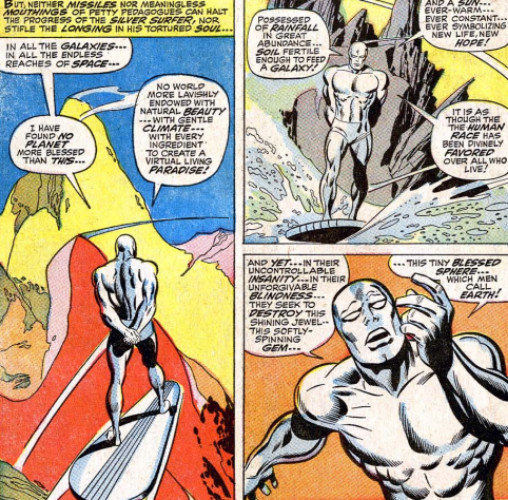
The Surfer becomes Lee's mouthpiece, and through his words, Lee makes his stance on the world clear. The rambling speeches serve the Surfer better than were they to come from a Peter Parker or Reed Richards–Lee's extensive vocabulary feels at home coming from a character established as this wandering intellectual, a man curious about existence outside his personal bubble, fascinated with his history and philosophy. The Surfer, seeking beauty in the world, decries humanity's cruelty, and you find yourself agreeing with him before realizing he's talking about you (unless you're not a human and reading this, for which I apologize). We see the world through the Surfer's eyes, and it's the very act of him being an outsider, inhuman but not untouched by humanity, which allows his musings to feel appropriate.
The narrative is certainly a product of its era, with both the Surfer story and its Watcher-centric backup strip both dealing with nuclear Armageddon in some form. To ward off Galactus, the Zenn-Lavian braintrust unleash their only weapon, a devastating beam of force called the "Weapon Supreme," which despite its name, is not a pizza. The force fails to stop Galactus, the ensuing shockwave devastating Zenn-La. Norrin Radd then chooses to sacrifice himself for his home, a planet he both loves and disdains. We are to believe his insightful intelligence allows him an advantage his ignorant peers do not possess, but this is treated as altruistic heroism over bravado. "Ages ago…a thousand times a thousand would have begged to fly that ship [to face Galactus]," a statesman says. "But now–there is only…Norrin Radd!"
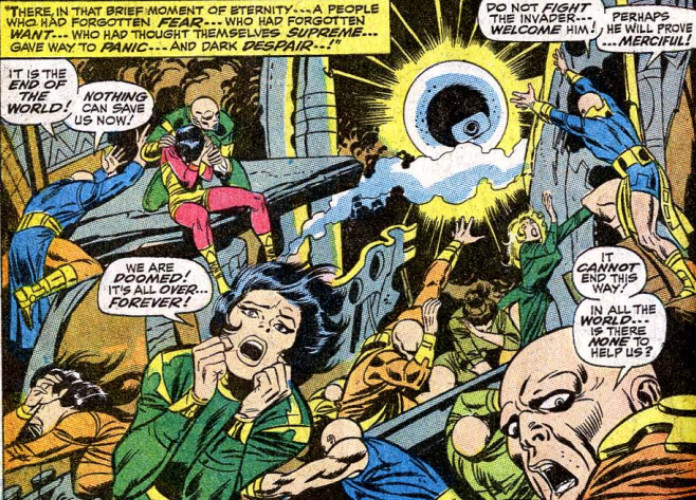
Written in Lee's typically overblown style, Norrin Radd is clearly a hero cut from the Marvel cloth, a man made more than a man by tragic circumstances forced to deal with the repercussions. In Norrin Radd's story, however, the consequences take a cultural bent. His people's apathy towards progress have placed them in the position where their only supposed hope is a single weapon which nearly annihilates them. And when they crawl from the wreckage, they look to the skies for someone else to save them.
In the Watcher backup strip, Lee, along with artist Gene Colan, take a decidedly Cold War bent to a similar notion. Zenn-La's folly is less historically connected to real world examples, maintaining a greater connection to human nature in general–who will we become as a society if we forget the past, fall for the simple joys of the here and now, and get lost in an apathetic ignorance which believes harm and danger are distant? "The Wonder of the Watcher," instead, features mutually assured annihilation between two alien planets, one of which is gifted atomic energy to harness for nuclear purposes by the Watchers. The tale's narrator, Uatu, justifiably blames his race for their ill-considered gift, the decision which leads all Watchers to swear to only observe life and not interfere. But Lee indicates people, when given such power, will selfishly use it against others…dooming themselves and their adversaries in the process. Progress turns to war and devastation on all sides. It doesn't take a Zenn-Lavian scientist to note the parallels between the U.S. and the Soviet Union at the time Lee penned this particular script.
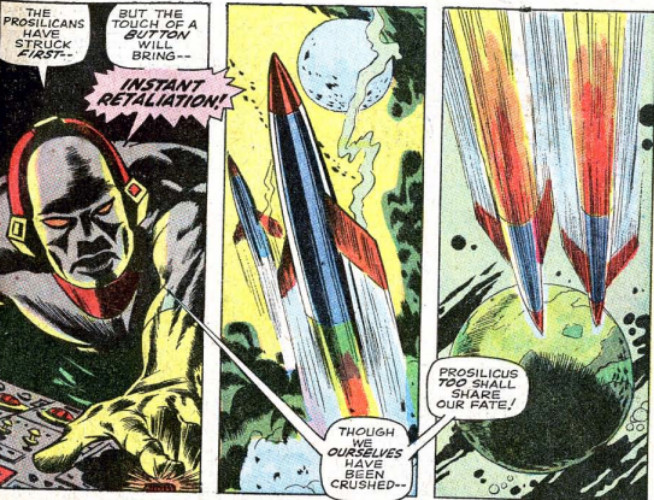
Yes, the parallels are obvious, the message a little ham-fisted once the sheen of warring alien races is removed. But Lee does well to introduce a layer of complexity by adding the Watchers as a third party. A genuinely kind gesture on their part is taken and abused–what they meant for a planet's benefit is repurposed for its destruction. We're not just left with, "And these two sides both perished, isn't that terrible?" No, we're left with, "And these two sides both perished, leaving a third to dwell in their unwilling, unwitting culpability." All the good the Watchers' gifts could bring to countless planets is eliminated by one recipient's uncaring decisions.
This issue seems like a downer, doesn't it? Nuclear holocaust born from the foolishness of unthinking mortal men. A protagonist stranded on a planet which does not understand him after freeing himself from a planet he did not understand. The Surfer, the product of noble sacrifice (two noble sacrifices, really), punished for his heroism. His girlfriend, left alone, believing she'll never see her beloved again. What, you wanted a Marvel hero to be happy?
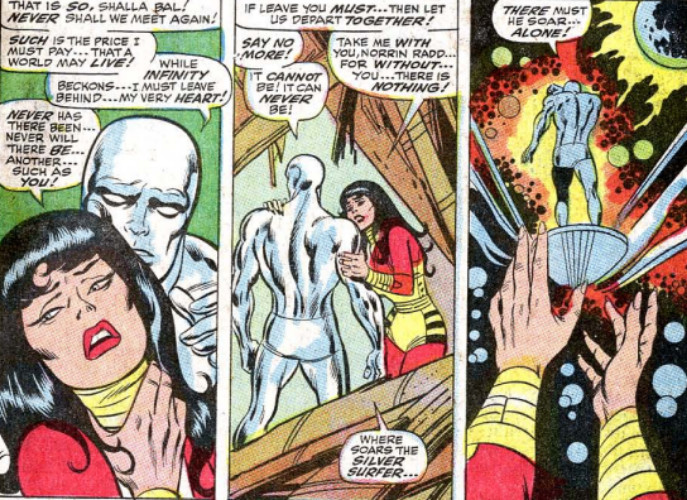
Lee, it seems, wants us to be left thoughtful rather than discouraged. From the Surfer's sacrifice, others lived. Though the Watchers unintentionally brought about nuclear holocaust, the real humans reading Lee's script didn't need to. I don't imagine any influential political figures of the day read this issue and thought, "My goodness, this Lee guy's a genius!" and began advocating for nuclear disarmament. But there is thought here, ideas for peace presented. Sure, they're hidden behind a thinly-veiled parable and a rather loquacious narrator, but deeper meaning is easier to find here than, say, a teenager dressed as a spider being doused in sand repeatedly.